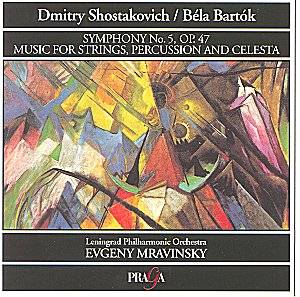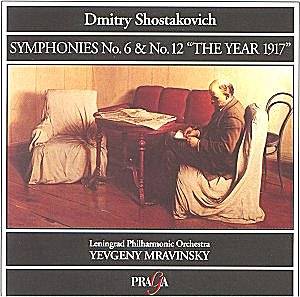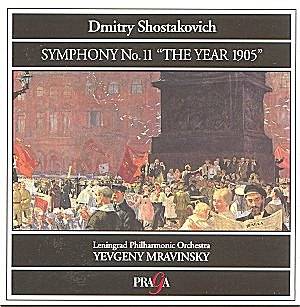These Praga discs have been around as separate issues since 1994 so, up to
a point, they are known quantities. In terms of quality they are from the
top and second top quartile of Mravinsky concert recordings. Drawn from live
concerts/radio broadcasts they suffer from the occasional bronchial salvo
but these are no real blemish set against Mravinsky's powerhouse music-making.
Though frustrating hopes that the radio archives might have yielded up Mravinsky
in different repertoire the compensation is that these alternative performances
are often abrasively larger than life. The emotional journey of each work
is presented to us at full pelt and with punches power-hammered rather than
pulled. While Mravinsky is capable of subtlety his forte is in sheer cliff-edge
excitement.
Devotees will already have these discs from the time when they were first
issued. For the rest of us what better opportunity could we ask to rub shoulders
with the undiluted force of Mravinsky in the context of live concerts with
(one exception - the violin concerto) his own orchestra. All this and at
a special price also.
The set has its disappointments but largely in that the radio archives have
not yet yielded up rarer repertoire. I would have liked to hear Mravinsky
in some Miaskovsky symphonies. The four Salmanov symphonies have been issued
on LP some years ago. We need these too.
DMITRI SHOSTAKOVICH
Symphony No. 5 [42.40] BELA
BARTÓK Music for strings, percussion and
celesta [27.27]
 Leningrad Philharmonic
Orchestra/Evgeny
Mravinsky. Leningrad Philharmonic
Orchestra/Evgeny
Mravinsky.  * recorded Prague live, 1967. ADD PRAGA PR256 016 [70.19]
* recorded Prague live, 1967. ADD PRAGA PR256 016 [70.19]
|

Mravinsky premièred a number of Shostakovich symphonies including
the Fifth. This performance is preferable, in audio terms, to the BMG-Melodiya
equivalent. The breezy allegretto emphasises the links with Prokofiev's
music for Romeo and Juliet. The third movement is a passionate snowstorm
of a Largo and the high octane rush of the finale reminds us of
Tchaikovsky 4 and 5 (works in which Mravinsky excelled). There are a few
coughs along the way.
Bartók's pungent intensity in the Music for Strings etc is
well caught as is the ponderously steely slither of the first movement.
Bartók's Concerto for Orchestra can be visited in the second movement.
The nocturnally oily shrill of the violins in the third movement is memorable.
The twanging bright finale glances at the Czardas, folk festivals and Gypsy
finery. The solo piano part is given prominence in this recording.
Reviewer
Rob Barnett

DMITRI
SHOSTAKOVICH Symphony No. 6 in B minor Symphony No. 12 in
D minor "The year 1917"
 Leningrad Philharmonic
Orchestra/Evgeny
Mravinsky. Leningrad Philharmonic
Orchestra/Evgeny
Mravinsky.  * recorded Prague 21 May 1955 ** recorded 6 January 1962. ADD PRAGA
PR256 017 [65.51]
* recorded Prague 21 May 1955 ** recorded 6 January 1962. ADD PRAGA
PR256 017 [65.51] |

Mravinsky has his excoriating way with both these symphonies. In the monothematic
12th he leaves the listener breathless and in awe of an orchestra
that can muster such acrid power. Shostakovich's gaudy is transformed into
the rawest primary colour conviction. It is as if memories of the Great Patriotic
war were still carried in the electrifying discharge of the brass and violins.
In the Sixth the great Largo pulses with a supercharged sorrow only slightly
tempered by the pulling of dynamic contrast by the Czech radio engineers
at several points. Fear of overload seems a reasonable concern in the company
of Mravinsky. His larger than life but always stonily serious approach produces
a completely undomesticated passion. This is as far from salon propriety
as you could possibly get.
Reviewer
Rob Barnett

DMITRI
SHOSTAKOVICH Symphony No. 11 in G minor, "The Year
1905"  Leningrad Philharmonic Orchestra/Evgeny
Mravinsky
Leningrad Philharmonic Orchestra/Evgeny
Mravinsky  Recorded House of Artists, Prague, 1967 Prague Spring International Music
Festival. ADD PRAGA PR256 018 [60.49]
Recorded House of Artists, Prague, 1967 Prague Spring International Music
Festival. ADD PRAGA PR256 018 [60.49] |

In a performance that will melt tar and blister paint Mravinsky tears into
this much derided symphony with such conviction that all doubts are effaced
- at least while you are listening. This disc can jostle elbows with the
best Berglund/Bournemouth (EMI) and the Helsinki de Preist (Delos). There
is little sign of gentleness. On the contrary the fire-hose pressure is
unrelenting and adrenaline pumping. Brazen, gaudy, dramatic and immediate:
the impact of this power-house music-making is not to be under-estimated.
Subtle it isn't. Memorable it is. It may yet spoil you for those perfect
but ultimately pallid studio recordings.
The Palace Square movement is heavy with hushed expectation. If you know
the night into dawn music from Walton's Henry V you will recognise
the signs. Mravinsky has his very flexible way with the flux and expansion
of the music and gales and gusts his way through the tempest of the second
movement. The finale is all news reel verismo; snapping and vituperative
music.
Reviewer
Rob Barnett

DMITRI
SHOSTAKOVICH Violin Concerto No. 1 [34.30]*
SERGEI PROKOFIEV Symphony
No. 6 [36.27]**
 *David
Oistrakh/Czech PO/Evgeny Mravinsky **Leningrad Philharmonic
Orchestra/Evgeny
Mravinsky *David
Oistrakh/Czech PO/Evgeny Mravinsky **Leningrad Philharmonic
Orchestra/Evgeny
Mravinsky  Recorded House of Artists, Prague, 1967 Prague Spring International Music
Festival ADD PRAGA PR256 019 [60.49]
Recorded House of Artists, Prague, 1967 Prague Spring International Music
Festival ADD PRAGA PR256 019 [60.49] |

Mravinsky knew Prokofiev's Sixth from the inside. He conducted the world
premiere and seems to have had the composer's blessing. Prokofiev even attended
the premiere. By then very ill he had the permission of his doctors to travel
to the Leningrad Great Hall when the premiere was given on 11 October 1947.
At first lionised and greeted as the great white hope of the Soviet Symphony,
within the space of only a month, Prokofiev 6 experienced a rapid cooling
in critical reception. The first Moscow performance met downbeat criticism
from the press. It took the brunt of an attack from Zhdanov's politicos and
promptly disappeared from the Russian concert world.
Mravinsky did not forget the work and when the thaw came he returned to the
work. The Czech Radio tapes disclose willow-supple strings which are sleek
and full of tone. Their pin-sharp attack is a joy. The impression is constantly
conveyed of a dominating concentration. There is no meandering. The focus
remains unrelentingly tight. Just lend an ear to the brass and percussion
attack towards the end of the first movement if you have any doubts about
broadcast tapes. Everything is picked out with clarity and acrid-toned precision
without for one moment being drained of passionate sap.
The violin concerto also sounds very well indeed. The work sandwiches a
devil-may-care helter-skelter second movement between tow more momentous
movements. Oistrakh is determined and bends and accents the music to bring
out the considerable emotional charge.
Reviewer
Rob Barnett

